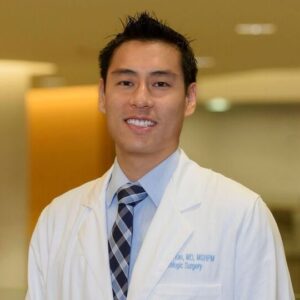Hung-Jui (Ray) Tan, MD, assistant professor of urology and director of the Urologic Oncology Fellowship Program, was named the 2021-2022 James W. Woods Junior Faculty Award recipient.

Hung-Jui (Ray) Tan, MD, MSHPM, assistant professor of urology in the Department of Urology at the UNC School of Medicine and director of the Urologic Oncology Fellowship Program, received the 2021-2022 James W. Woods Junior Faculty Award. The aim of the award is to support and retain promising young members of the UNC School of Medicine clinical faculty.
“I’m deeply honored and thankful. UNC has so many tremendous research and clinician scientists, many of whom have supported me during my early career, so I feel extremely lucky to be awarded,” said Dr. Tan, who is also the director for Resident and Student Research in the Department of Urology.
Dr. Tan’s research focus centers on the quality and safety of cancer care delivery. While exploring the comparative effectiveness of surgical innovations in kidney cancer, Tan was first-author on studies published in top journals, such as The Journal of Urology, Cancer, and JAMA. His work has also been published in the Journal of Clinical Oncology and the Journal of the American Geriatrics Society.
Through advanced training, his research has grown from evaluating quality to effecting change to improve care and health outcomes for patients with cancer. His research aims to identify, craft, and operationalize new health IT tools that enable better communication of evidence and information, so patients and physicians can make higher quality decisions. Through a career development award funded by the American Cancer Society called, “Designing Visual Tools to Enhance Cancer Surgeon Decision-making,” Dr. Tan studies how surgeons interface with health IT tools and how this relates to their decision-making about surgery for cancer. With the results, a prototype visual decision support tool will be developed and pilot tested in the community and academic urologists in North Carolina.
Dr. Tan is currently involved in two large studies focusing on supporting decision-making on the patient side. He serves as co-principal investigator for GRADE-SRM, a clinical trial that studies the decision-making experience of patients with localized kidney cancer, the impact of renal mass biopsy on decisional regret, and the feasibility of obtaining genomic data through renal mass biopsy. Second, in partnership with researchers in the UNC Hussman School of Journalism and Media and the UNC School of Nursing, he and his team initiated a new study called, “Personalizing Kidney Cancer Communication to Support Patient-Centered Decision-Making,” funded by the U.S. Department of Defense. Based on preliminary findings in GRADE-SRM, the new study explores more deeply the information and decision support needs of patients and develops a framework for personalized communication.
In addition to teaching in the clinic and the operating room, Dr. Tan also supervises other mentored projects that aim to address disparities in cancer care and trial participation based on race/ethnicity and rurality. Through cutting-edge research exploring the intersection between aging and kidney cancer care, Dr. Tan continues to work towards transforming how patients and clinicians receive, process, and apply information to make the best possible choices in cancer care.
“I think being both a researcher and a clinician offers rich perspective,” said Dr. Tan. “As a researcher and a clinician, I see where we need to do better for patients. And on the frontlines, I see how potential solutions can be deflating. The EHR is a great example – you can’t deny there are real benefits, but the user experience has been a major source of surgeon dissatisfaction. How can we help surgeons be the best version of themselves, and can we do it in a manner that respects their autonomy and values their experience? That’s what drives me.”
Dr. Tan graduated from the North Carolina School of Science and Mathematics and earned his undergraduate degrees in chemistry and economics from Duke University. His training began in earnest during his residency in urology at the University of Michigan. Afterward, he pursued advanced fellowship training in urologic oncology and health services research through the Institute of Urologic Oncology and the Robert Wood Johnson Foundation Clinical Scholars Program at UCLA. During that time, he also served as a staff physician at the Veterans Affairs West Los Angeles Medical Center and the Olive View-UCLA Medical Center.
Dr. Tan will speak about his research from 3pm-4pm on November 10 as part of University Research Week.
Written by Brittany Phillips, UNC Health Communications Specialist